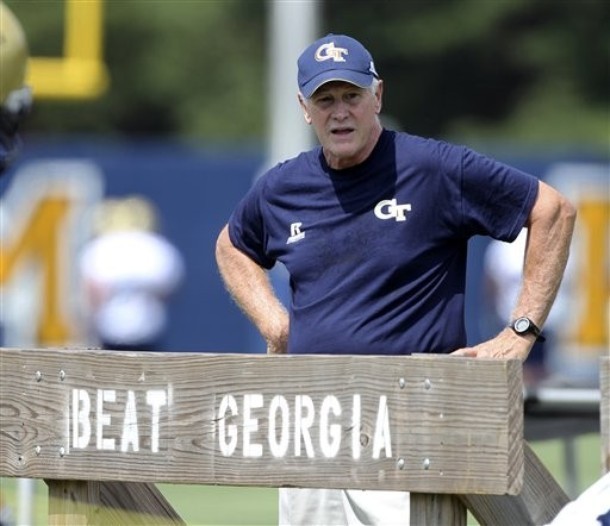ATLANTA -- Al Groh is waiting for the phone to ring for his Georgia Tech defense.
Groh, the former Virginia coach, has installed a 3-4 defense at No. 16 Georgia Tech, which opens its season on Saturday against South Carolina State.
The first-year defensive coordinator says the Yellow Jackets understand the defense and provide all the correct answers when asked about assignments in a classroom setting.
But he wants more.
Groh says he's looking forward to the time when his players prove they have mastered the 3-4 scheme with instinctive play on the field.
"Sometimes a player can show up well in the drills and develop a technique that is not showing up in the scrimmages," Groh said. "So I asked them, 'When your phone rings, how much do you have to think about what you need to do? You've just done it so many times. When we tell you what the drill is and what the read should be, you do very well. When you have to react to it, it's still not quite there.'"
Groh said it takes time for a defense to become so comfortable in a new scheme that its play becomes instinctive. His defenses usually need a year to master the 3-4 scheme, he said.
"We're trying to speed the process up," Groh said. "Every time we have done this installation, we do a lot better the second year than the first."
A makeover on defense was needed even after Georgia Tech finished 11-3 and won the Atlantic Coast Conference championship in 2009. Coach Paul Johnson fired defensive coordinator Dave Wommack three days after the Yellow Jackets' 24-14 Orange Bowl loss to Iowa.
Georgia Tech gave up 30 or more points in six games last season, including a 30-24 home loss to in-state rival Georgia to end the regular season.
While some fans called for a new defensive scheme, Johnson said he just wanted better results, no matter the scheme.
"The one thing we want to hang our hat on and we've tried to establish here is that we play hard and we're tough," Johnson said Tuesday. "If we do that, we'll be OK."
Johnson had a blunt assessment of the 2009 defense.
"We weren't very good," he said. "Sometimes when you're not playing good everybody wants to blame the scheme. Sometimes you're just not real good. They might be better than you. So we need to play better."
Georgia Tech ranked 58th in the nation with its average of 24.8 points allowed last season.
"Sometimes the frustration level set on them last year," Johnson said. "We'll find out how they handle that the first time somebody makes a few first downs and drives it down the field. Does their head go down or does somebody get ticked off and say, 'We've got to stop them. This is not happening.' That's what we need."
Groh, 66, was 59-53 in nine years as Virginia's coach and was fired after a 3-9 record in 2009. He was 26-40 as Wake Forest's coach in the 1980s and was 9-7 as the New York Jets' coach in 2000, his only year as an NFL head coach.
Groh was an NFL assistant under Bill Parcells with the New York Giants and New England Patriots.
South Carolina State coach Buddy Pough said Groh's Georgia Tech defense "is a bit of a mystery for us."
Pough said he knows Groh as "a 50 guy since he was with the Giants."
The 50 defense featured five defensive linemen and two linebackers. The 3-4 can provide a similar look when the two outside linebackers line up close to the three linemen.
"He's always been that kind of style guy," Pough said. "You never know how he's changed over the years as he's been a head coach, and how he'll go about implementing his style of defense with the type of guys he has with Georgia Tech. We may have to adjust on the fly."
Georgia Tech linebacker Brad Jefferson, voted a team captain, said the defense is close to feeling comfortable in the new scheme.
"We're getting to that point. We're still working on it," Jefferson said last week. "We're going to have to clutch up and get down to it. But we're getting the feel of it."
Tuesday
August 19th, 2025
12:27AM









